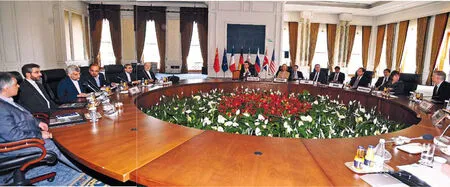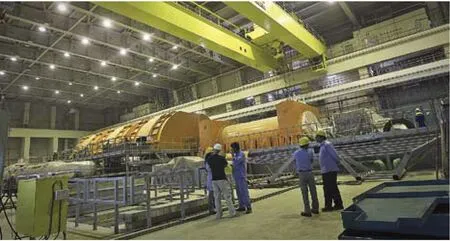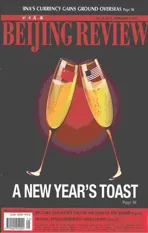Fruitless Nuclear Talks
2011-11-17ByHUALIMING
By HUA LIMING
Fruitless Nuclear Talks
By HUA LIMING
Both Iran and the United States choose to play hardball on the nuclear issue
The most recent negotiations on the Iranian nuclear issue ended without agreement on January 22 in Istanbul. Iran was on one side of the negotiating table, while the five permanent UN Security Council members—the United States, Britain, France, China and Russia—and Germany were on the other.
After the negotiations, both sides stated their stances. Catherine Ashton, the EU High Representative for Foreign Affairs and Security Policy, said the six countries initially thought they would have thorough and constructive negotiations in Istanbul, but Iran was obviously not prepared to enter discussions unless the other countries accepted its preconditions. She described the situation as disappointing. On the other side, Iran’s chief negotiator Saeed Jalili said Western representatives were attempting to impose orders on Iran, rather than conducting dialogue with the country.
U.S. and European negotiators urged Iran to prove it had peaceful intentions for its nuclear plan in accordance with the Nuclear Non-proliferation Treaty.
In recent negotiations, Iran was prompted to undertake confdence-boosting measures, such as strengthening the international monitoring of the country’s nuclear activities. But Iran insisted other nations respect Iran’s right to produce enriched uranium for peaceful purposes, and demand they remove sanctions against Iran. Ashton said she had urged bilateral contact between Iran and the United States, but that Iran refused.
Low expectations
To most observers, the results of the Istanbul negotiations were expected. Before negotiations even began, the United States and Russia said they were not counting on any sort of breakthrough.

It is understood that Iran and the United States are on opposite sides of the nuclear issue, and the Istanbul negotiations actually were a competition between Washington and Tehran. Prior to the talks, each side overvalued the hand it was holding and believed the other nation would give in. Despite their determination, both sides were wrong.
U.S. President Barack Obama’s administration has been using carrot-and-stick policies on Iran. Last June, the United States pushed the UN Security Council to pass Resolution 1929, sanctioning Iran. Then, Washington united its allies to add unilateral sanctions against Tehran. It is believed that these actions hurt Iran badly.
At the beginning of 2011, the United States launched new sanctions against Iran, adding 20 more Iranian companies to the blacklist. When U.S. Secretary of State Hillary Clinton visited Gulf countries, she also called for further sanctions. And when the United States returned to the negotiating table, it was not due to sincerity, but was simply a symbolic gesture as part of its carrotand-stick strategy.
Iran’s rise
Although Iran is generally weaker, its self-confdence is stronger than ever, and that makes the nation a serious challenger of the United States.
例2(2012湖北卷·理10)我国古代数学名著《九章算术》中“开立圆术”曰:置积尺数,以十六乘之,九而一,所得开立方除之,即立圆径.“开立圆术”相当于给出了已知球的体积V,求其直径d的一个近似公式人们还用过一些类似的近似公式.根据π=3.14159…判断,下列近似公式中最精确的一个是( ).
After halting uranium enrichment in 2003, Iran resumed the process two years later, with more advanced technology and greater capabilities. The country now has more than 5,000 centrifuges and 3.5 tons of 3.5-percent enriched uranium. In addition, an International Atomic Energy Agency report said Iran is now capable of producing 20-percent enriched uranium.
Iran currently has much more bargaining power than eight years ago, so it makes sense that the country is making greater demands than it did in 2003. As former U.S. National Security Advisor Zbigniew Brzezinski said, Washington must be more realistic about the Iranian nuclear issue, as the clock will not run backward. Now that the Iranians have obtained the ability to enrich uranium, he said, they will not abandon it.
Iran may have more geopolitical clout and Western media have pointed out that this is why Iran refused to make any compromises in the recent negotiations.
In Iraq, Nouri al-Maliki, a pro-Iran Shiite, defeated the Saudi Arabia-backed Sunni bloc and formed a new cabinet last December. In Lebanon, pro-Iran Hezbollah successfully broke down the U.S.-supported Saad Hariri administration in January. The political balance in the Middle East is now leaning in Iran’s favor.
Iran has calculated once the United States leaves Iraq, Iran will become a leading regional power and it will have mastery of the whole situation. Washington will have no other option but to work on Iran’s terms and Iran is waiting for the best offer.
The new rounds of sanctions didn’t work as Washington expected. These sanctions did hurt Iran’s oil, banking and financial systems, but they didn’t directly affect the livelihoods of the Iranian people. The Mahmoud Ahmadinejad government even reformed Iran’s subsidy policy, canceling the oil, food, water and power subsidies that Iranian families had enjoyed for decades. Still, there was no turbulence in Iran and this stable domestic situation added to Iran’s negotiating power.

XINHUA/REUTERS
Future options
In light of the fruitless negotiations, the United States may push for a ffth round of international sanctions against Iran, which will make the possibility of settling the nuclear issue even more faint. Fortunately, neither side shut the door completely. After the Istanbul negotiations, Ashton said the offer is still on the table and the negotiation door is still open. Iranian President Ahmadinejad also confrmed Iran is willing to continue negotiations in the future.
The core of the Iranian nuclear issue lies in the hostility between Washington and Tehran. The United States has treated Iran as a hostile country since Iran’s Islamic Revolution in 1979, and has tried to change the current Iranian regime. Iran also considers the United States its biggest security threat, and intends to eliminate the U.S. impact on the Gulf region and the Middle East.
When the nuclear issue emerged in 2003, Washington was concerned a nuclear-armed Iran may threaten U.S. interests in the Middle East. So it attempted to topple the Iranian regime with an international show of strength, united by non-proliferation. In the meantime, Iran has tried to use the nuclear issue to force Washington into compromise.

XINHUA
It will be tough to solve the Iran nuclear issue within a short time, because it is not possible to reverse Iran’s determination to pursue its nuclear plan. Inside Iran, the issue is now completely politicized, leaving the government no leeway.
The United States will not tolerate an Iranian challenge to its Middle East supremacy. A strong Iran is a “legacy” of the George W. Bush administration. Since changing the attitude toward Iran is not in accordance with U.S. policy, the Obama administration continued to adopt a hard-line policy on Iran.
The Obama administration took an even tougher stance after the midterm elections, due to a strong neo-conservative political infuence. There is also a sizeable anti-Iran presence in the United States. However, it would be diffcult for Washington to decide on military action. Neither war nor peace is appropriate in this situation and the result could be a long-term cold war between the nations.
Washington may launch more economic sanctions against Iran, hoping that either internal conflict will overthrow the current Iranian regime, or Iranian leadership will change its policies toward the United States. Moreover, the United States will seek to cooperate with Israel to destroy Iran’s nuclear plan. Iran, however, will try to complete its nuclear plan as early as possible while coping with sanctions and negotiating with the United States.
There is also a possibility for the United States and Israel to launch a joint strike against Iran if they feel Iran is about to develop a nuclear weapon.
The author is a former Chinese ambassador to Iran
